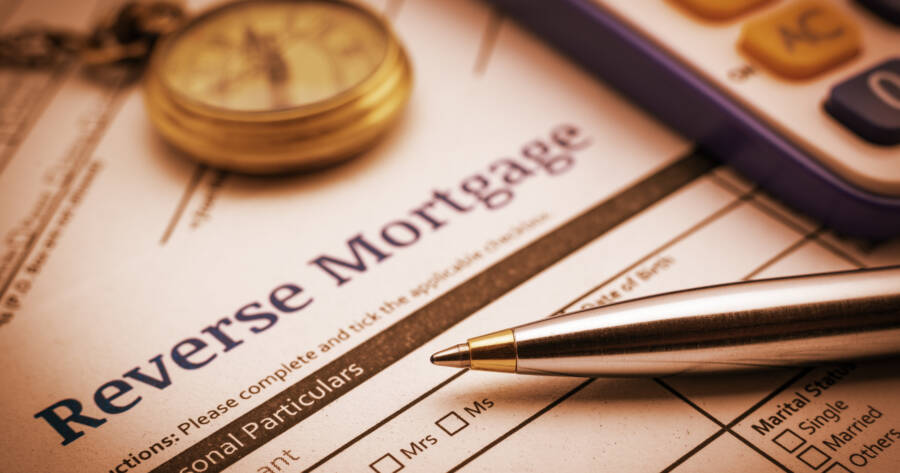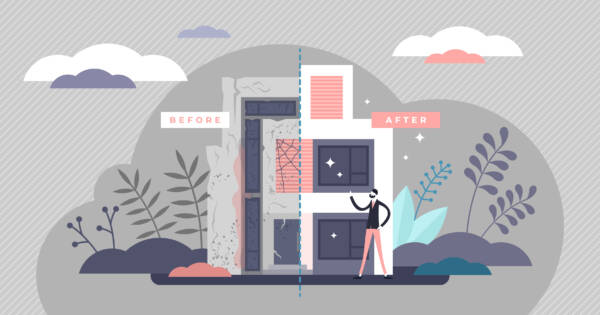If you’re age 62 or older, own your own home, and are searching for different ways to fund your retirement, securing a reverse mortgage might be the answer for you. A reverse mortgage is a financial product that enables you to easily convert the equity in your home into usable cash.
Whether you need the financial means to pay off your current mortgage or cover substantial healthcare expenses, a reverse mortgage can give you a line of credit minus the need to repay a monthly loan or hit you with unwanted fixed monthly payments. Here’s a brief outline concerning both the pros and cons of getting a reverse mortgage.
How Do Reverse Mortgages Work?
It’s likely you bought your home with a “forward” or standard type of mortgage, wherein you make regular payments each month to a financial lender. However, in the case of a reverse mortgage, the lender gives you monthly payments instead. They are gradually buying the equity in your home. You still hold your property’s title that serves as security for the course of the loan. The loan is paid in full when you pass away or sell the home.
- Reverse Mortgage: The equity in your home decreases and your debt increases.
- Forward Mortgage: The equity in your home increases and your debt decreases.
Types of Reverse Mortgages
There are basically three types of reverse mortgages.
Single-Purpose Reverse Mortgages
This specific kind of mortgage is offered by local, state, or nonprofit organizations. It’s generally considered the most cost-effective approach of the three. The provider specifically identifies the purpose of the reverse mortgage and the money can only be used for a specific expense. In addition, homeowners must have to qualify for this type of mortgage. One advantage of this type of loan is the lower initial cost.
Home Equity Conversion Mortgages (HECMs)
HECMs, or home equity conversion mortgages, are federally-insured mortgages that are supported by HUD (Department of Housing and Urban Development) in the U.S. It’s likely that a HECM will cost more than a standard home loan and usually carries higher upfront costs as well. This is the most widely used kind of reverse mortgage, since it doesn’t carry any medical requirements or income restrictions. It can be used for virtually any purpose.
Proprietary Reverse Mortgages
A proprietary reverse mortgage is often used for homes appraised at much higher values and can thus offer larger advances. Those people with lower mortgages are eligible for greater funds.
Reverse Mortgage Pros
A reverse mortgage can be a complex financial product. On the other hand, they do have some potential advantages if you meet certain conditions.
- No matter how you receive the cash, you’re usually not obligated to pay it back as long as you’re living in the home as your primary residence.
- Typically, you can choose the way you receive the cash. One lump sum, a line of credit, a standard monthly amount, or any combinations of these are options.
- Loan proceeds are not considered taxable income.
- There’s no set required minimum income in order to qualify since you’re not required to make a monthly repayment.
- Cash advances usually don’t impact your Medicare or Social Security benefits.
- According to the Federal Trade Commission (FTC), if you receive a higher number of payments than what your home is actually worth (for example, if you outlive the loan), you’re free from owing more than the home’s overall value.
- You get to keep the title to your home and remain its legal owner.
- Once your home is sold and all the lending fees are paid in full, any remaining equity in your home goes straight to you or passed down to your heirs.
- If you have a HECM, you can live in an assisted living facility as long as a year before your loan is due. That gives you time to sell the house.
Reverse Mortgage Cons
- You must be 62 or older to qualify.
- You must pay for and go through mandatory counseling regarding mortgages.
- Over time, your debt increases since interest keep adding to the balance of the loan.
- Closing costs and loan origination fees are often expensive. However, they can sometimes be financed by rolling them into the total cost of a loan.
- Reverse mortgages consume your home’s equity and leave both you and your heirs with fewer overall assets.
- During the life of the mortgage, you could possibly be charged with monthly service fees.
- There are restrictions on how much money you can borrow throughout the first year in addition to how large a mortgage you can secure.
- Most reverse mortgages are actually variable interest rate loans that are tied to short-term indexes.
- If you fail to properly pay your homeowner’s insurance or property taxes, the loan can quickly become due before you’re ready.
- You’re not allowed to deduct any interest until the loan is paid in full.
Like any other financial tool at you disposal, it’s in your best interest to thoroughly go over all the details before making a final decision. Carefully weigh the pros and cons before securing a reverse mortgage for your home. Speaking to a financial expert (note: not a bank salesperson) first will help protect your family and your assets.
Is a Reverse Mortgage Right For You?
According to a Journal of Urban Economics article, reverse mortgages defaulted at a much higher rate than normal mortgages. This is usually a result of homeowners lapsing on their property tax or house insurance. The higher default rate is seen by many as a sign that reverse mortgages are being sold to those who are financially desperate. So don’t be so fast to jump aboard if your bank calls offering you one.
That being said, a reverse mortgage can work for you — if you do things right.
For example, if you plan to stay in your current house until you pass away, a reverse mortgage is a great way to use your home’s equity while you’re still alive. As a bonus, if you live longer than expected, you might even come out ahead on the deal. However, if you were hoping to leave something of value to your heirs, a reverse mortgage will eat into the value of your estate.
When The Loan Comes Due
We mentioned above that you won’t have to pay back the loan until one of the following things happens: the last borrower passes away, the house is sold, or you don’t live in it for a period of 12 months (usually the result of moving into a retirement community or healthcare facility). At that point, you (or your heirs) have a few different options.
Pay Off The Loan and Keep the House
This is obviously only an option if you didn’t sell the house while still living. But if you pass away, your family could choose to pay off the reverse mortgage entirely and keep the house. Since most people won’t have a large pile of liquid cash available for such a purchase, they can apply for a traditional mortgage to pay off the reverse mortgage.
Sell The House
If they have no intention of keeping the house to live in, your heirs can sell it outright. They will use the proceeds to pay off the reverse mortgage. Any money left after that is theirs to keep, as part of their inheritance. Alternately, you can usually let the lender sell the house themselves. You’ll still get any remaining equity after the reverse mortgage debt is settled. However, it will probably be a bit less than if you sold the home yourself, since you’ll be charged a fee by the lender for doing the work.
The Bottom Line
“Reverse mortgage” is just a fancy marketing name for a Home Equity Conversion Mortgage. The product doesn’t provide free money or anything. You are simply borrowing against the equity in your house. It’s a debt that will eventually have to be paid back — either by you or your heirs. There’s no escaping that eventual truth.
However, if you’re running low on retirement savings but still need a place to live, a reverse mortgage might be the right choice for you. It’s a bit of a complicated product, so make sure you consult a financial expert before you sign any papers. You should also make sure that your wills are updated to reflect the reverse mortgage. It’s also a good idea to inform your children or heirs of your decision. They may believe they are inheriting a valuable piece of real estate, only to find out it’s high leveraged. That’s not a fun discovery in the middle of grieving.
The bottom line, as with any major financial decision, is “do your homework.” Research all your options and then decide if a reverse mortgage suits your retirement life needs and wants. Consider the tax implications and how it might affect the estate you’ll leave for your family.








